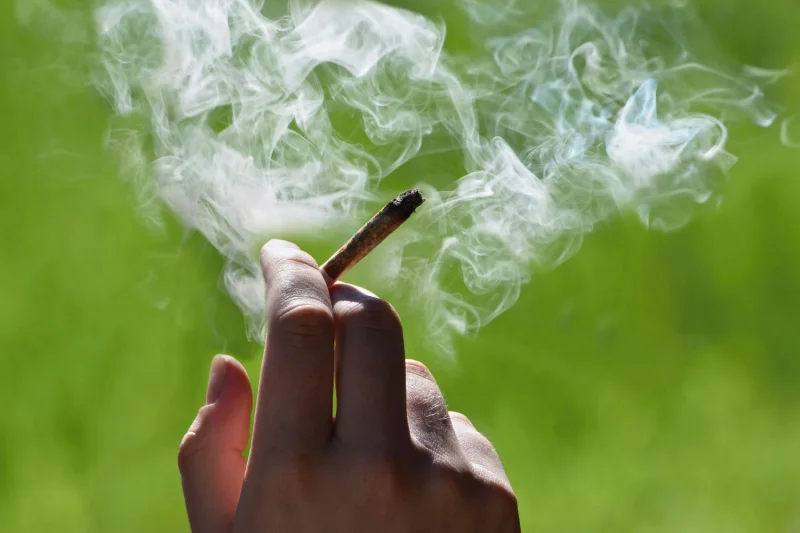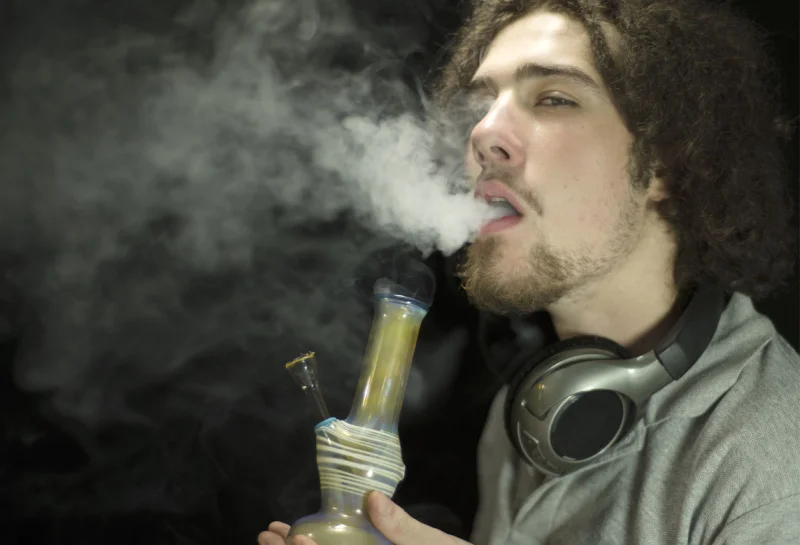Is Marijuana Addictive? Understanding Cannabis Effects, Withdrawal, and Treatment
Marijuana, also known as cannabis, is one of the most misused drugs in the world. Part of marijuana’s popularity is the widespread belief that it is either non-addictive or less addictive than other drugs. But is this true? Is marijuana addictive or not?
The truth is marijuana is addictive. In fact, about 3 out of every 10 regular marijuana smokers could be diagnosed as having a cannabis use disorder, better known as marijuana addiction.
But why is it still so prevalent? And why is it difficult to treat marijuana addiction?
According to psychiatric mental health nurse practitioner (PMHNP) Valerie Puffenberger, “As more states are legalizing and decriminalizing cannabis, it is perceived as ‘OK’ to use since it is legal. There are no approved medications for cannabis use disorder. Most patients will want to reduce their use to a controlled level, but it is difficult to determine what that level is.”
Although marijuana addictions are widely believed to be less “severe” than other substance use disorders, cannabis addiction is a serious problem affecting millions of Americans.
When Is a Cannabis Use Disorder Diagnosed?
In the United States, the mental health and addiction rehab communities rely on the Diagnostic and Statistical Manual of Mental Disorders (DSM), now on its fifth edition, to determine whether an individual’s problematic substance use is at the level of an addiction.
To be diagnosed with a marijuana addiction, an individual must exhibit physical and/or mental signs that their body and mind have become dependent on the substance to function “normally.” They must also exhibit behaviors involving their marijuana use that negatively impact their lives.
The DSM lists 11 criteria that may indicate a marijuana addiction. At least three criteria must be met for a cannabis use disorder to be diagnosed. The more criteria present, the more severe the addiction is considered. For example, an individual exhibiting four criteria would be considered to have a less severe addiction than someone exhibiting nine criteria.
The 11 criteria for marijuana addiction are:
- A marijuana tolerance, or the individual requiring higher and higher doses of marijuana to achieve the same effects
- Marijuana withdrawal, or the individual experiencing a collection of unpleasant physical and mental symptoms when reducing or ceasing marijuana use
- Using larger amounts of marijuana and for longer time periods than intended
- A desire to cut down or eliminate marijuana use, possibly with one or more failed attempts to do so
- Spending significant time obtaining, using, or recovering from using marijuana
- Marijuana use is negatively impacting the person’s ability to fulfill personal, professional, legal, or familial obligations
- Continuing marijuana use despite it causing major problems in relationships
- Reducing time spent on other recreational, social, or professional activities because of marijuana use
- Repeatedly using marijuana in environments where it is unsafe to do so
- Repeated marijuana use despite awareness of the physical or psychological problems it is causing
Factors That Determine If Marijuana Is Addictive

Although marijuana addiction is one of the most common substance use disorders after alcoholism and nicotine addiction, the vast majority of those who try cannabis—even the vast majority of those who regularly use marijuana—will not develop a cannabis use disorder. But why do some people develop a marijuana use disorder and others don’t?
A number of factors determine whether marijuana is addictive to a specific person.
THC Content and Potency of Marijuana
The active ingredient in marijuana (the one that causes most of the drug’s desired effects) is delta-9-tetrahydrocannabinol, or THC. The higher the THC content of marijuana, the higher its potency can be. Because the THC content of marijuana varies wildly from plant to plant, some strains of marijuana are dramatically stronger than others.
The higher the THC content, and therefore the potency, of the marijuana that an individual uses, the more likely they are to develop an addiction. Not only are they more likely to develop an addiction, but they are likely to do so more rapidly. And the addiction is likely to be more severe.
Frequency and Duration of Marijuana Use
Different marijuana users consume very different amounts of the drug. Generally, the more a person uses marijuana, the more likely it is that they develop an addiction.
When describing the amount of use, the appropriate terminology will typically involve how the marijuana was consumed, such as via a joint (marijuana cigarette). A heavy marijuana user is likely to be one who smokes more than one joint a day.
The longer an individual has been using marijuana, the more likely it is that they will have developed an addiction. For example, someone who has been smoking marijuana for 20 years is more likely to have an addiction than someone who has been smoking for two months. Similarly, longer-lasting addictions are more likely to be more severe in nature.
Genetics and Environmental Factors
Different individuals are more or less likely to develop addictions to marijuana (and other substances) based on unique genetic and environmental factors. Genetics has been shown to be one of the most, if not the single most, important factors in whether marijuana is addictive to a person.
If you have genes that predispose you to a marijuana addiction, you are much more likely to develop one. If you have genes that protect you from addiction, you are much less likely to develop one. Genetics also play a role in the speed and severity with which marijuana addictions develop.
There are numerous environmental factors that make marijuana addictive. Some of them include:
- The local legality and availability of marijuana
- The existence of personal and formal support systems
- The frequency and nature of local policing
- Alternatives to marijuana use
- Family, religious, and friend attitudes toward marijuana use
- Socioeconomic status and class
Signs of Marijuana Addiction
There are many signs that someone may be suffering from a marijuana addiction. Some of the most common include:
- Anxiety
- Bloodshot or red eyes
- Changing social circle
- Cottonmouth
- Different attitudes or beliefs
- Drug paraphernalia
- Financial problems
- Frequent tiredness or sleepiness
- Impaired judgment and perceptions
- Impaired memory
- Increased appetite
- Low motivation
- Mood swings
- No longer participating in formerly enjoyed activities
- Paranoia
- Problems at work, school, or home
- Secrecy
- Weight gain
“The consequences associated with cannabis use are minimal compared to other substance use disorders, and most do not have problems related to their use,” says Puffenberger. “But cannabis addiction can affect one’s quality of life.”
Physical and Psychological Effects of Marijuana Use

Marijuana is a powerful drug that has powerful physical and psychological effects on the mind and body of users. Marijuana has been documented to cause a wide variety of impacts.
Some of the most common physical effects of marijuana include:
- Bloodshot eyes
- Dry mouth
- Increased appetite
- Loss of coordination
- Reduced reaction times
Some of the most common psychological effects of marijuana include:
- Anxiety
- Changes in mood and motivation
- Changed perception of time
- Euphoria (feeling high)
- Impaired judgment and memory
- Paranoia
- Tiredness and sleepiness
Withdrawal Symptoms and Timeline for Marijuana Addiction
Marijuana withdrawal occurs in individuals who have developed a marijuana dependence. Marijuana dependence occurs when an individual’s body has become so accustomed to the presence of marijuana that it no longer functions “normally” without the drug. When a marijuana-dependent individual stops taking the drug or reduces the amount they use, they will experience a set of symptoms collectively known as withdrawal.
While marijuana withdrawal can be very uncomfortable and unpleasant, it is not considered to be as severe as withdrawal from many other drugs, and it is not considered to be dangerous or deadly.
What withdrawal symptoms will be present will vary from individual to individual based on several factors, including gender, weight, the presence of any other co-occurring addictions or mental health conditions, the length and severity of the addiction, and more. However, some of the most common marijuana withdrawal symptoms include:
- Changes in sleep patterns
- Changes in energy levels
- Decreased appetite
- Depression
- Headaches
- Mood changes
- Nausea and vomiting
- Pain or physical discomfort
- Strange dreams
- Worsening mental state
As is the case with which marijuana withdrawal symptoms appear, the exact marijuana withdrawal timeline will vary substantially from person to person. However, a typical marijuana withdrawal timeline will look something like this:
Marijuana Withdrawal Timeline: Days 1-2
The first withdrawal symptoms typically appear 24 to 48 hours after the last use of marijuana. These symptoms are comparatively mild.
Marijuana Withdrawal Timeline: Days 3-7
Marijuana withdrawal symptoms will generally get worse (although typically moderately) for two to five days after they first appear. Additional symptoms may appear during this time.
Marijuana Withdrawal Timeline: Days 8-21
Within a week of them first appearing, most marijuana withdrawal symptoms will begin to subside. Most individuals will see most or all their symptoms severely decline in severity or disappear entirely within three weeks.
Marijuana Withdrawal Timeline: After 21 Days
In some cases, individuals may experience lingering marijuana withdrawal symptoms for up to two years after discontinuing use. This is known as post-acute withdrawal syndrome, or PAWS.
Treatment Options for Marijuana Addiction
If you or someone you love is looking for marijuana addiction treatment, you don’t need to look any further. Legacy Healing Center offers treatment programs designed to help those suffering from marijuana addiction take control of their lives and begin their healing journeys.
We believe our holistic treatment approach enables patients to heal their minds, bodies, and spirits. By providing patients with clinical therapy, proper medication management, aftercare, and integration of life, Legacy gives patients the tools they need to achieve and maintain sobriety.
Call Legacy Healing at 888-534-2295 today for more information on how you or your loved one can start treatment for marijuana addiction.
Marijuana Addiction FAQs
What makes marijuana addictive?
Marijuana is addictive because the drug’s chemicals, specifically THC, can cause psychological and physical dependence. These chemicals can also cause physical and mental changes that can have negative impacts on an individual’s life. This combination of dependence and negative consequences from THC is why marijuana is addictive.
Can someone experience marijuana withdrawal symptoms?
Marijuana withdrawal symptoms are caused by marijuana dependence. Essentially, when you use large amounts of marijuana over an extended period, your body adapts to the presence of the drug.
Your body may no longer produce some chemicals (like natural endocannabinoid neurotransmitters), or it may produce excessive quantities of other chemicals. Your body also may no longer be experiencing conditions that marijuana treats.
When you reduce how much marijuana you are taking, or stop entirely, your body will take some time to adjust to the new “normal.” The withdrawal symptoms you experience are the side effects of your body readjusting. Some withdrawal symptoms may also be the return of symptoms that marijuana use was suppressing.
How is marijuana addiction treated?
Marijuana addiction is treated the same way that addiction to other drugs or alcohol is treated, with some differences. While drugs like alcohol or benzodiazepines require medically supervised detox, that is rarely the case for marijuana use disorders. Additionally, there are no currently approved medications for the treatment of marijuana addiction.
Instead, marijuana addiction is usually treated with a combination of rehab and therapies. Marijuana rehab can either be inpatient or outpatient. Inpatient marijuana rehab requires patients to reside in a treatment facility where they will participate in a number of treatment programs, most involving various therapies and educational resources. Outpatient marijuana rehab requires patients to live elsewhere and come to treatment for several hours a day, several days each week.
In general, inpatient marijuana rehab is more expensive than outpatient options, but it also provides a greater likelihood for long-term sobriety. Outpatient marijuana rehab is typically less expensive and allows patients to continue meeting personal, professional, and familial responsibilities.
How does marijuana addiction compare to other drug addictions?
Marijuana use disorders can be very serious, and in some cases, may even cause crippling effects on the lives of those impacted. Marijuana addictions should always be treated with the same seriousness as any substance use disorder.
However, marijuana addictions are generally not considered to be as severe as those caused by many other drugs. In particular, marijuana addiction is typically considered less serious than addiction to benzodiazepines, alcohol, and opioids. Those drugs are much more likely to cause death or lasting serious consequences than marijuana.
Additionally, marijuana addictions are considered substantially easier to overcome than most other drug addictions. Marijuana is considerably less physically addictive than many other drugs, and marijuana withdrawals are considerably less severe and dangerous than those associated with many other drugs.
Sources
- Centers for Disease Prevention and Control. (2020, October 19). Addiction (Marijuana or Cannabis Use Disorder.
- National Institute on Drug Abuse. (2020, July). Is Marijuana Addictive?
- Department of Justice/Drug Enforcement Administration. (2020, April) Marijuana/Cannabis.
- University of Michigan. (2021, January 8). More Than Half of People Using Cannabis for Pain Experience Multiple Withdrawal Symptoms.



